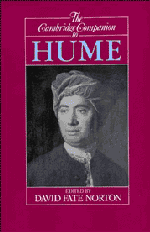Book contents
- Frontmatter
- 1 An introduction to Hume's thought
- 2 Hume's new science of the mind
- 3 Hume and the philosophy of science
- 4 Hume's scepticism
- 5 Hume's moral psychology
- 6 Hume, human nature, and the foundations of morality
- 7 The structure of Hume's political theory
- 8 David Hume: Principles of political economy
- 9 Hume's literary and aesthetic theory
- 10 David Hume, "the historian"
- 11 Hume on religion
- Appendix: Hume's autobiographies
- Bibliography
- Index of Names and Subjects
- Index of Citations and References
Appendix: Hume's autobiographies
Published online by Cambridge University Press: 28 May 2006
- Frontmatter
- 1 An introduction to Hume's thought
- 2 Hume's new science of the mind
- 3 Hume and the philosophy of science
- 4 Hume's scepticism
- 5 Hume's moral psychology
- 6 Hume, human nature, and the foundations of morality
- 7 The structure of Hume's political theory
- 8 David Hume: Principles of political economy
- 9 Hume's literary and aesthetic theory
- 10 David Hume, "the historian"
- 11 Hume on religion
- Appendix: Hume's autobiographies
- Bibliography
- Index of Names and Subjects
- Index of Citations and References
Summary
In the spring of 1734, Hume accepted a position with a Bristol merchant. His philosophical endeavours were not going well, and so he determined to put these “aside for some time, in order the more effectually to resume them.” As he travelled to Bristol, he wrote to an unnamed physician, probably John Arbuthnot, to ask advice about dealing with “the Disease of the Learned” that afflicted him. Whether or not Hume actually sent another copy of this letter is not known, but the surviving manuscript furnishes us with a valuable account of the first years of his adult life. The text printed here is based on the original manuscript deposited in the National Library of Scotland, and is published with the permission of the Royal Society of Edinburgh. The title is taken from the letter itself.
Sir
Not being acquainted with this hand-writing, you will probably look to the bottom to find the Subscription, & not finding any, will certainly wonder at this strange method of addressing to you. I must here in the beginning beg you to excuse it, & to perswade you to read what follows with some Attention, [and] must tell you, that this gives you an Opportunity to do a very good-natur'd Action, which I believe is the most powerful Argument I can use. I need not tell you, that I am your Countryman, a Scotchman; for without any such tye, I dare rely upon your Humanity, even to a perfect Stranger, such as I am. The Favour I beg of you is your Advice, & the reason why I address myself in particular to you need not be told. As one must be a skilful Physician, a man of Letters, of Wit, of Good Sense, & of great Humanity, to give me a satisfying Answer, I wish Fame had pointed out to me more Persons, in whom these Qualities are united, in order to have kept me some time in Suspense.
- Type
- Chapter
- Information
- The Cambridge Companion to Hume , pp. 345 - 356Publisher: Cambridge University PressPrint publication year: 1993
- 1
- Cited by

